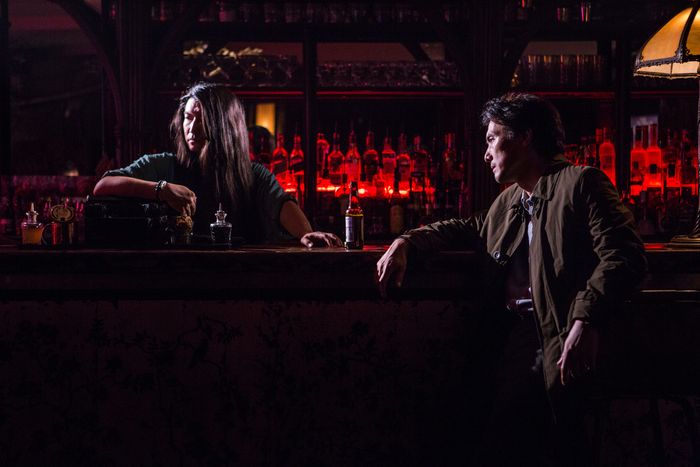
In the end, I found Tokyo Vice to be aggressively mediocre. After an enticing opening half that slowly luxuriated in its ’90s-era Tokyo setting, the season disintegrated under the weight of its cascading plot threads, splayed in endless directions and mostly left unresolved. What was up with the suicides again? Did the Yakuza chief’s illness matter at all? Weren’t there angry Mormons looming somewhere? Sure, it’s supposed to be pulpy noir, but that doesn’t mean things have to be this incoherent.
Still, I’d be lying if I said I didn’t enjoy watching Tokyo Vice. And to be fair, that has more to do with my personal fondness for Yakuza crime dramas than anything else; the HBO Max series does make me wish we’d get more of them in this age of streaming abundance. More than anything, though, it made me wish for more seasons of Giri/Haji, the criminally underrated 2019 British-Japanese gangster drama that, sadly, only ran for eight episodes.
Originally produced for BBC Two and distributed internationally by Netflix (where you can stream it), Giri/Haji is an uncommonly smart show that stitches together two variations of the crime genre: the British gangster flick and the Yakuza epic. The end result is an elegant cross-cultural production that not only feels radically new but diligently captures the thrills of both its inspirations.
The series centers on a Tokyo detective, Kenzo Mori (Takehiro Hira, brooding), who’s tasked with tracking down his long-lost brother, Yuto (Yōsuke Kubozuka, sizzling), after a murder in London sparks an escalating conflict between rival Yakuza gangs in Japan. Yuto, a Yakuza member previously presumed dead, is believed to be responsible for the killing, and Kenzo, working under orders from his police chief and one of the warring Yakuza bosses, is covertly sent to London to find out whether his brother is actually to blame. Meanwhile, in classic detective-story fashion, Kenzo’s home life isn’t looking too hot either: Kenzo’s relationship with his wife, Rei (Yūko Nakamura), is strained; his live-in mother and ailing father are indifferent to him; and his teenage daughter, Taki (Aoi Okuyama), is adrift and acting out.
Once in London, things get even more complicated. Kenzo soon discovers that Yuto is, indeed, alive and well but now works for an enterprising British gangster and is very much responsible for the instigating murder. As Kenzo tries to untangle the mess, he’s aided in his quest by Sarah (Kelly McDonald), an exiled British police officer; Rodney (Will Sharpe), a half-Japanese sex worker; and Taki, who runs away from home to join her father in the U.K. Shootouts, conspiracies, and fish-out-of-water hijinks ensue.
Yeah, it’s a lot. And not unlike Tokyo Vice, Giri/Haji sets the table by laying down a dizzying number of narrative threads. But where the former ends up unwieldy and nihilistic — owing to the noir tradition, perhaps — Giri/Haji tightly constructs a universe in which everything matters. “Someone threw a stone a long way away, and we’re only just feeling the ripples,” a Yakuza boss says at one point. Almost every thread and character loops back into the narrative, which is a remarkable feat given just how much is squeezed into its short run.
This saga might start out centering on Kenzo, but the narrative repeatedly shifts across its sprawling set of characters, giving each a tangible presence in the world they exist within. This applies even to many of the individuals who seem peripheral at the start. For the first few episodes, Rei seems to be a generic “detective’s wife who serves as an emotional obstacle for the protagonist,” but she ends up having an arc of her own, driven by her own agency. The enterprising British gangster (a riotous Charlie Creed-Miles), played mostly for laughs and plots, is given just enough space for his own dreams and motivations.
That so many characters are able to have a meaningful impact on this story reflects one of Giri/Haji’s central ideas: What’s largely interpreted as fate is often simply the aggregate consequence of one’s actions and commitments to one another. Every choice has meaning, good and bad. And while not everybody makes it to the end, everyone is significant.
Sure, this all sounds like heady stuff, maybe even hoity-toity, but none of it would work if the whole thing weren’t so fun. Better still: As a visual production, Giri/Haji is not only gorgeous but supremely confident in its choices. This is a show that routinely breaks with its largely realist format in favor of flair and emotion. A pivotal moment between the Mori brothers, revisited throughout the story, is presented at a different aspect ratio and color saturation to heighten the mood. Bursts of animation are deployed to create a sense of mythology or to flesh out a hypothetical. There is even, ludicrously, a contemporary-dance sequence in the series’ most climactic point, a daring dash of surrealism that sacrifices narrative momentum to honor the rich emotional entanglement of the ensemble — and, unbelievably, it works.
This being a bloody crime saga, Giri/Haji doesn’t quite have a happy ending. While there are pockets of optimism to be found, the ripples of Kenzo & Co.’s actions are simply too great to resolve, and the show leaves most of its characters to deliciously ambiguous fates. There are, however, some promising loose ends that will unfortunately be left dangling. This being a production affiliated with Netflix, the series was canceled after one season despite its obvious excellence, one in a very long line of similar cancellations reflecting an aggregate choice that’s now bringing severe consequences to the streamer. Don’t let that deter you from checking out this show, however. That single season still very much works as a stellar stand-alone piece of television, the kind that leaves you wishing for more and glad to have what was already given.


